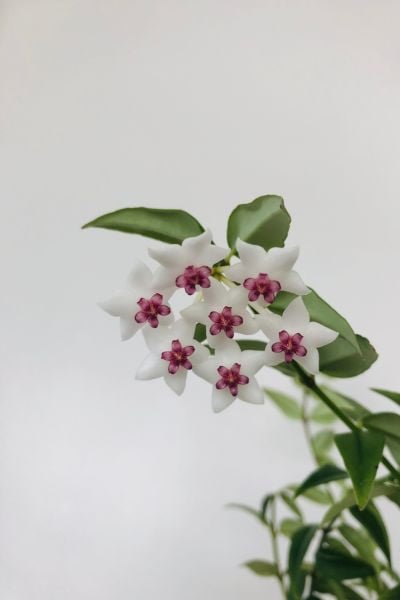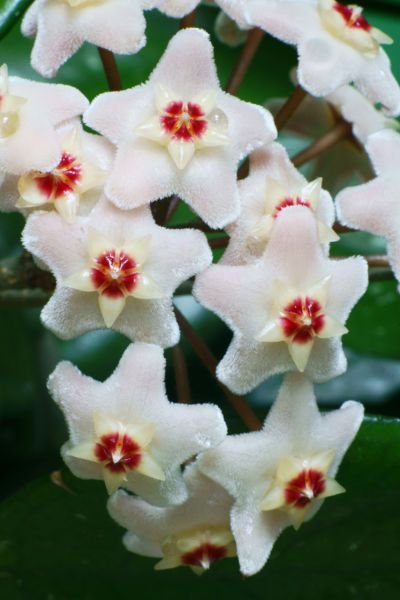For indoor gardeners seeking a touch of elegance and beauty, few plants rival the allure of the Hoya Bella plant. This delightful houseplant, known for its star-shaped blossoms and trailing vines, has captured the hearts of gardening enthusiasts around the world. In this comprehensive guide, we will journey into the captivating world of Hoya Bella, offering insights into its care, propagation, and the joy it brings to your indoor garden. Discover how to encourage Hoya Bella flower blooms and explore variegated varieties such as Hoya Bella Luis Bois and Hoya Bella Albomarginata.
Check out July Birth Flower: A Symbol of Passion and Devotion Here

Unveiling the Beauty of Hoya Bella
Hoya Bella, a member of the Apocynaceae family, is often referred to as the “Miniature Wax Plant.” Its botanical name, Hoya lanceolata bella, hints at the plant’s graceful beauty. What makes this houseplant so special is its dainty, porcelain-like Hoya Bella flower blooms that resemble stars in the night sky.
Key Features of Hoya Bella
Before you welcome Hoya Bella into your indoor garden, let’s explore its key features:
- Star-Shaped Blossoms: The star-shaped Hoya Bella flowers, usually pink or white with a crimson center, are the hallmark of Hoya Bella’s charm.
- Trailing Growth: Its trailing vines make it an ideal candidate for hanging baskets or decorative containers.
- Low Maintenance: Hoya Bella is relatively easy to care for, making it perfect for both novice and experienced indoor gardeners.

Check out How to Grow and Care for Lantana Here
Hoya Bella Varieties
Hoya Bella enthusiasts can delve into a world of variations, such as Hoya Bella Luis Bois and Hoya Bella Albomarginata, each offering unique foliage and flowering patterns. The Hoya Bella variegated varieties add an extra layer of beauty to your indoor garden.
Planting and Care Tips
Cultivating Hoya Bella is a rewarding experience. Here are some essential tips for nurturing this enchanting houseplant:
- Light Requirements: Provide bright, indirect sunlight to encourage robust growth and abundant Hoya Bella blooms.
- Watering: Allow the top inch of soil to dry before watering. Be cautious not to overwater, as Hoya Bella prefers slightly drier conditions.
- Temperature: Maintain a warm and consistent temperature range of 60-80°F (15-27°C).
- Humidity: Hoya Bella thrives in humid conditions. Regular misting or using a humidity tray can help.
Check out How to Grow and Care for French Hydrangeas Here
Hoya Bella Plant Care and Propagation
Caring for your Hoya Bella plant involves understanding its unique needs. Regular care, including pruning and repotting, will ensure its health and vitality. Additionally, explore Hoya Bella propagation methods to share the joy of this houseplant with fellow gardening enthusiasts.
Troubleshooting: Yellow Leaves and Light Requirements
If you notice Hoya Bella yellow leaves, it may be a sign of overwatering or insufficient light. Adjusting your care routine can help restore the plant’s vibrancy. Proper understanding of Hoya Bella light requirements is key to maintaining its lush appearance.
Check out How to Grow and Care for Azaleas Here
Conclusion
Hoya Bella is not just a houseplant; it’s a testament to the beauty and simplicity of indoor gardening. With its star-shaped blossoms, easy maintenance, and propagation possibilities, it’s a delightful addition to any indoor garden. Whether you’re a seasoned indoor gardener or just starting your green journey, consider adding these exceptional varieties, along with Hoya Bella Anneke Buis, to your collection and experience the elegance it brings to your living spaces.
Caring for Hoya Bella is a rewarding and enjoyable endeavor. By following the care tips and propagation methods mentioned in this guide, you can ensure that your Hoya Bella thrives and continues to grace your indoor garden with its timeless beauty.
Note: Always adapt care guidelines to your specific indoor gardening conditions and environment.
Pingback: Hoya Bella: The Charming Star of Your Indoor Ga...
Pingback: 20 flowers that start with the letter D -
Pingback: Snapdragons : Exploring Varieties, Including Pink Snapdragons
Pingback: 16 Lovely Flowers That Start with the Letter N - Gardener's School
Pingback: 11 Different Types Of Money Plants For Your Home - Gardener's School
Pingback: 10 Seeds that Look Like a Brain - Gardener's School